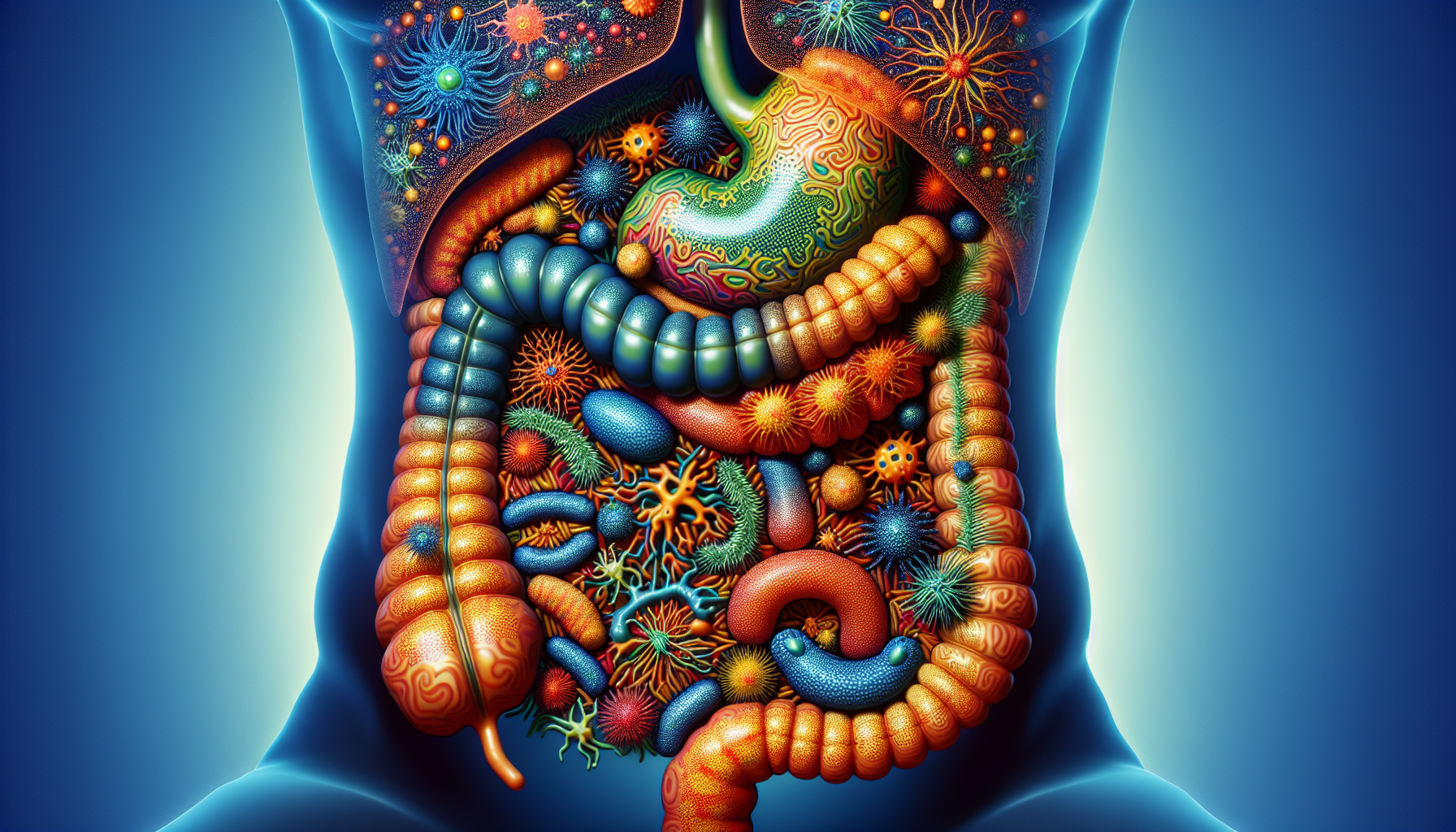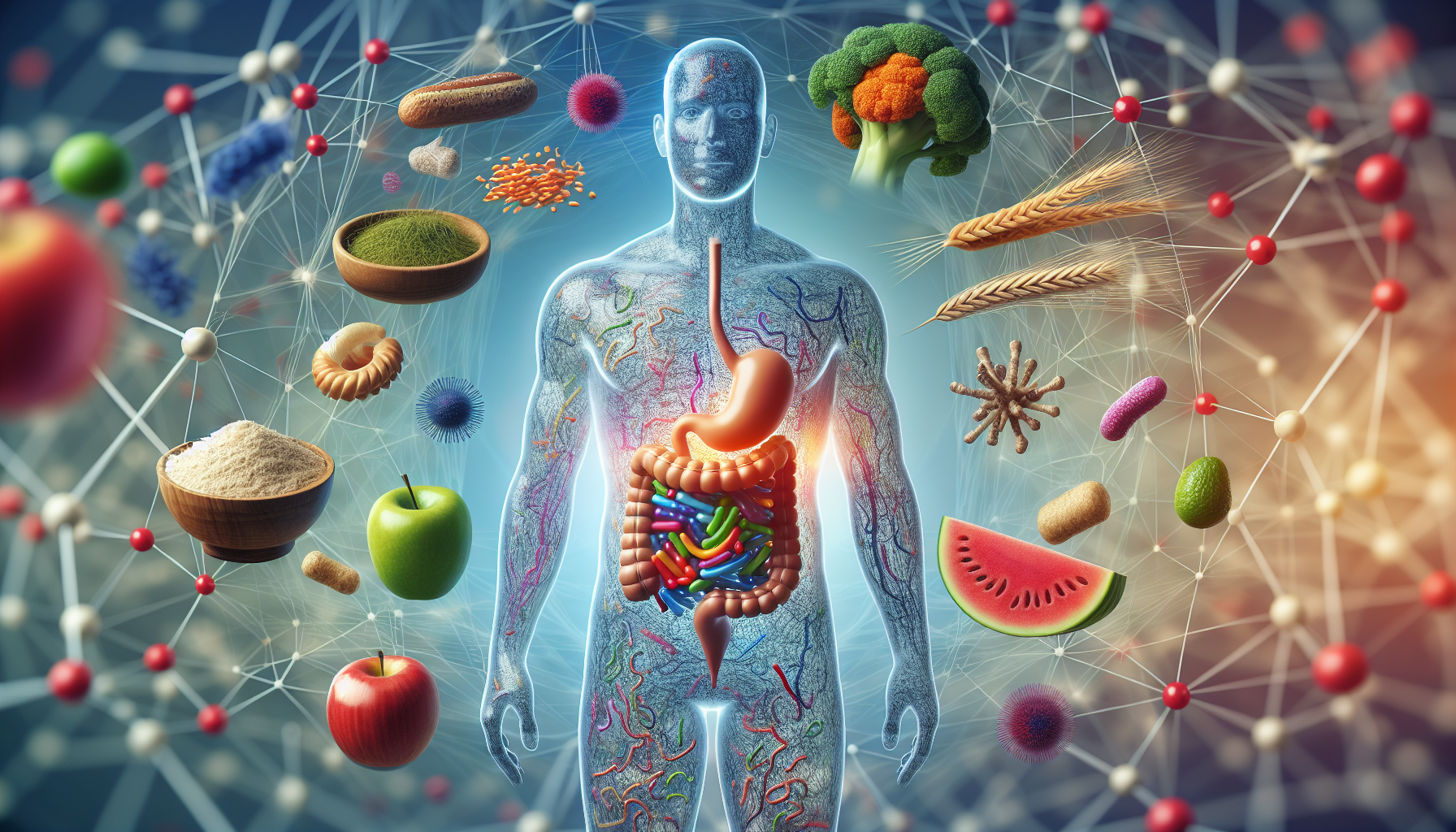Optimizing Your Gut Microbiome: The Key to Enhanced Health and Well-Being
The microbiome, your body’s internal ecosystem of microorganisms, is pivotal to maintaining health. It affects everything from digestion to immune defense. But how can it be optimized for better health? This article unpacks the complexities of the microbiome and guides you through strategies to enhance its beneficial impact on your well-being.
Key Takeaways
The gut microbiome plays a crucial role in digestion, immune regulation, vitamin production, and metabolism, affecting overall health and the functioning of various body systems.
Diet, lifestyle, stress, age, and exposure to medications like antibiotics can significantly influence the composition and balance of the gut microbiome, with potential impacts on health outcomes.
Strategies for optimizing gut microbiome health include dietary interventions such as prebiotics and probiotics, lifestyle changes like increased fiber intake and regular exercise, and the prospect of personalized microbiome management tailored to individual needs.
Understanding the Microbiome: The Basics
In the bustling metropolis of the gut, trillions of microbial citizens thrive, each playing its role. Bacteroidetes and Firmicutes, the dominant clans, coexist in a delicate balance, orchestrating digestion and health. Amidst this microcosm, a daily drama unfolds, as they collectively shape their human host's well-being.
The human gut microbiome is a fascinating world, a veritable universe within us that is teeming with diverse microorganisms. This complex web of life, known as the microbiome, refers to the collective genomes of microorganisms inhabiting a particular environment. In the human body, the largest microbial community is found in the gut, specifically in the colon, boasting over 100 trillion microbes. [Ferranti EP et al]. The human microbiome project has further expanded our understanding of microbial ecology of this intricate ecosystem.
These microscopic inhabitants are not merely passive residents, but active contributors to vital functions such as:
digestion
vitamin production
immune system regulation
metabolism
They play an integral role in maintaining overall health.
From regulating the immune system to producing neurotransmitters that influence brain health, the gut microbiome’s influence is far-reaching and profound.
Gut Microbes and Their Functions
Our health is intricately linked with the gut microbiota which is indispensable to our metabolic processes and immune system development. The gut microbes, for instance helps with:
metabolizing nondigestible carbohydrates
producing essential nutrients such as certain vitamins and amino acids, which are vital for various metabolic processes
enhancing the host’s protection by producing antimicrobial compounds and interacting with the host’s innate immune system.
These microbes serve as both defenders and gatekeepers. They assist with:
preventing the colonization of pathogenic bacteria by producing antimicrobial agents
decreasing the pH (making more acidic) of the colon through the fermentation of dietary fibers
synthesizing vital vitamins such as B12 and K, which influence processes like immune function and energy metabolism
These functions highlight their critical role in maintaining human health.
Human Gut Microbiota Composition
Every individual houses a unique universe of microbes within their gut, which is part of the broader human microbiota. The human gut microbiota consists of approximately 100 trillion microbes, encompassing up to 5000 different species, and weighing around 2 kilograms. These gut microbes are overwhelmingly composed of anaerobic bacteria, with the dominant phyla of intestinal bacteria being Bacteroidetes and Firmicutes, together representing 90% of the gut microbiota.
Key bacterial species in the gut include:
Firmicutes
Bacteroidetes
Actinobacteria
Proteobacteria
Fusobacteria, and
Verrucomicrobia
Firmicutes, along with Bacteroidetes, form the bulk of the gut microbiota and are particularly prevalent in adults. While the gut microbiota shows stability at the phylum level, substantial interindividual variation exists at the species level, attributed to functional redundancy within major phyla. Microbial colonization of the gut starts at birth and is shaped by factors such as the mother’s microbiota, delivery method, and a combination of external and host-related factors.
An individual’s gut microbiota diversity and composition can be influenced by a complex interplay of factors that includes diet, drugs, and anthropometric measures. The gut microbiota varies in density and composition along the length of the gastrointestinal tract, exhibiting different bacterial profiles between regions such as the small intestine and colon.
Factors Affecting Your Gut Microbiome
In a vibrant kingdom within, diverse fiber from fruits, vegetables, and grains arrive, bestowing gifts upon the gut's grateful microbes. Together, they forge health, crafting shields against disease, and fueling the body's vigor.
Various factors, including environmental factors, can dramatically affect the dynamic ecosystem of the gut and intestinal microbiota itself. Some of these factors include:
Lifestyle choices
Diet
Stress
Age
Exposure to chemicals
These factors can all have a significant impact on the gut microbiota, leading to changes that can affect health in numerous ways.
An imbalance in the ratio between Bacteroidetes and Firmicutes species in the gut, for instance, is associated with health and disease.
Diet and Nutrition
The gut microbiome is significantly shaped by our diet. Our food choices can influence the landscape of our gut microbiota, promoting the growth of certain microbial species while suppressing others. A diet rich in animal protein, for instance, can shift gut microbes towards less-beneficial strains, while fiber-rich diets enhance microbial diversity and support metabolic health.
Dietary fiber is metabolized by gut bacteria into Short Chain Fatty Acids (SCFAs), which impact the composition bacterial diversity and function of the gut microbiota, support the integrity of the intestinal barrier, and reduce inflammation. Importantly, SCFAs such as butyrate, propionate, and acetate serve not only as energy sources for colonocytes but also as signaling molecules that modulate the immune response, influence gene expression, and help in regulating the gut-brain axis. Thus, a diet high in diverse types of fiber can be particularly beneficial for gut health.
Conversely, high-fat and high-protein diets can lead to reduced diversity of gut microbiota and increased production of harmful metabolites like hydrogen sulfides and ammonia. These metabolites can be detrimental to gut health, leading to a compromised intestinal barrier, increased gut permeability, and even triggering inflammation. This inflammation can contribute to a variety of diseases, including metabolic syndrome, type 2 diabetes, and cardiovascular diseases.
Therefore, understanding the intricate relationship between diet and gut microbiota composition is crucial for maintaining a healthy gut ecosystem and preventing disease. By choosing a diet rich in plant-based foods and diverse fibers, we can foster a gut environment that supports our overall health and well-being.
Plant Phytochemicals
Plant phytochemicals, the naturally occurring compounds in plants, can have a profound influence on the gut microbiome. These bioactive compounds are found in a variety of foods, including fruits, vegetables, grains, and legumes. They play a significant role in plant defense against pathogens and contribute to the color, flavor, and aroma of plant foods. Importantly, when consumed, they can promote the growth of beneficial bacteria and inhibit harmful ones, thereby improving gut health and potentially reducing the risk of chronic diseases.
The interplay between plant phytochemicals and the gut microbiome is a promising field of study, offering potential strategies for maintaining and improving gut health. Research suggests that these phytochemicals can modulate gut microbial composition and activity, leading to enhanced gut barrier and function, improved metabolic outcomes, and a strengthened immune response. This synergy between plant-derived compounds and gut microbes is an exciting area of exploration that could lead to new insights into the prevention and treatment of various health conditions.
Antibiotics and Medications
While antibiotics and medications can be life-saving, they can also disrupt the gut microbiota, leading to negative consequences such as reduced microbial functionality and increased susceptibility to infections. Exposure to antibiotics during pregnancy and early life can compromise the development of a balanced gut microbiota, increasing the risk of various diseases such as colitis, asthma, allergies, and obesity in the offspring.
Long-term effects of antibiotic treatment can lead to lasting alterations in microbial composition, with some individuals experiencing an incomplete recovery of the gut microbiota months after treatment.
Gut Microbiome and Health Conditions
Once harmonious, the gut's microbiota turned chaotic. Dysbiosis took the throne, and the body's realm faltered. Beneath, a rebellion of ailments arose—IBD, IBS, diabetes, obesity, liver disease. The once peaceful kingdom, now a battleground for health, whispered a plea for balance to regain its former vitality.
The gut microbiome, while mainly beneficial, can also be a double-edged sword. Imbalances in the gut microbiota, known as gut dysbiosis itself, can contribute to a range of health conditions. Gut microbiota dysbiosis has been identified as an environmental factor that may trigger various health conditions, particularly in individuals with a genetic predisposition. This imbalance in the gut ecosystem has been linked to several disorders, including autoimmune diseases like systemic lupus erythematosus (SLE), as well as metabolic and digestive conditions.
Inflammatory Bowel Disease (IBD)
Inflammatory Bowel Disease (IBD) is a group of disorders, including Crohn's disease and ulcerative colitis, characterized by chronic inflammation of the digestive tract. This inflammation is often associated with an altered gut microbiota composition, which can exacerbate the condition's symptoms and contribute to its progression.
Irritable Bowel Syndrome (IBS)
Irritable Bowel Syndrome (IBS) is another gastrointestinal disorder that manifests as a collection of symptoms including abdominal pain, bloating, and altered bowel habits. Research suggests that an imbalance in the gut microbiota may play a significant role in the pathophysiology of IBS, and that restoring microbial balance could alleviate symptoms.
Diabetes
Type 2 diabetes is a metabolic disorder that has been associated with changes in the composition and function of the gut microbiota. Dysbiosis may influence insulin resistance and glucose metabolism, thereby playing a role in the development and progression of diabetes.
Obesity
Obesity is closely linked to gut microbiota dysbiosis, with alterations in the microbiome composition potentially affecting energy balance, fat storage, and inflammation. These changes may contribute to the onset and perpetuation of obesity, as well as associated metabolic complications.
Liver Disease
Liver diseases, such as non-alcoholic fatty liver disease (NAFLD) and cirrhosis, have also been associated with gut microbiota dysbiosis. An imbalanced microbiome may influence liver function and contribute to disease progression through mechanisms like increased intestinal permeability and systemic inflammation.
Overall, the evidence suggests that maintaining a healthy gut microbiota is crucial for preventing and managing these diverse health conditions.
Strategies for Optimizing Your Gut Microbiome
Once upon a time in a bustling gut galaxy, yogurt, kefir, and sauerkraut united as probiotic superheroes. They embarked on a quest to restore harmony to the microbiome realm, battling bad bacteria and fortifying the intestinal fortresses. Together, they triumphed, bestowing balance and well-being upon their human host.
As we’ve discovered, overall health greatly depends on maintaining a balanced gut microbiota. So, how can we optimize our gut microbiome? Several strategies, ranging from dietary interventions to lifestyle changes, are available for our use.
Prebiotics, Probiotics, Synbiotics, and Polyphenols
One method to support a healthy gut microbiota is to incorporate prebiotics, probiotics, synbiotics, and polyphenols into your diet. Prebiotics are food components or ingredients that nourish beneficial colonic micro-organisms, while probiotics are live micro-organisms that confer health benefits when administered in adequate amounts. Synbiotics are combinations of prebiotics and probiotics that act synergistically to improve gut health. Polyphenols, found abundantly in fruits, vegetables, tea, coffee, and wine, are plant compounds that can also positively affect the microbiota by promoting the growth of beneficial bacteria and inhibiting pathogens.
Lifestyle Changes
Health of the gut microbiome can also be improved through lifestyle changes. For instance, implementing lifestyle changes that gradually increase dietary fiber, along with a variety of polyphenol-rich foods, can mitigate gastrointestinal discomfort and support gut microbiome health.
Regular physical activity, adequate hydration, and stress management are also crucial for maintaining a healthy gut microbiota, which contributes to a healthy gut microbiome.
Personalized Microbiome Management
In a world where every gut tells a unique tale, scientists craft a bespoke microbiome map. With precision, they navigate the microbial cosmos, tailoring diets and probiotics to each individual's intestinal flora. Health blooms anew, as personalized care transforms the gut's narrative into one of harmony and vitality.
As observed, the profoundly individualized gut microbiota can significantly affect our health through its interactions with diet and host metabolism. This realization has led to the concept of personalized microbiome management, which offers new therapeutic avenues for managing host-microbiota interactions and metabolic disorders.
Summary
In this blog post, we have embarked on a fascinating journey through the microscopic world within us, exploring the vast universe of the gut microbiome. We’ve seen how the gut microbiota, our internal ecosystem, plays a crucial role in our health, from aiding digestion and immune function to influencing heart and brain health.
We’ve also discovered how various factors, from diet and lifestyle to antibiotics, can impact the gut microbiota. We’ve explored the connection between gut microbiome dysbiosis and health conditions, and learned about strategies for optimizing the gut microbiome. Finally, we’ve touched upon the promise of personalized microbiome management, a burgeoning field that offers new therapeutic avenues for managing host-microbiota interactions and metabolic disorders.
So, as we conclude our journey, it’s clear that the gut microbiome is not just a fascinating world within us, but a crucial part of our health. By understanding and managing our gut microbiota, we can unlock the door to enhanced health and well-being.
Frequently Asked Questions
Which diet is best for microbiome?
A diet rich in a range of plants, including leafy greens, fruits, vegetables, nuts, seeds, beans, and grains, is found to be good for microbiome diversity. This includes incorporating various foods in salads, breakfast, and stir fry.
What is the main function of the microbiome?
The main function of the microbiome is to aid in digestion, regulate the immune system, protect against harmful bacteria, and produce essential vitamins. This is important for overall health and well-being.
Is microbiome good or bad?
The microbiome is both good and bad, with most microbes being symbiotic and beneficial, while some can be potentially harmful. Overall, a healthy microbiome consists of a balance between beneficial and potentially harmful microbes.
How can I improve my gut microbiome?
Improve your gut microbiome by eating a variety of fresh, wholefoods, especially those from plant sources like fruits, vegetables, legumes, beans, nuts, and whole grains. This will provide the right fuel for a balanced gut microbiome.
What is the gut microbiome and why is it important?
The gut microbiome is vital for digestion, the host immune system function, and overall health as it consists of the microorganisms living in our gut.
References
Ferranti EP, Dunbar SB, Dunlop AL, Corwin EJ. 20 things you didn't know about the human gut microbiome. J Cardiovasc Nurs. 2014 Nov-Dec;29(6):479-81. doi: 10.1097/JCN.0000000000000166. PMID: 25290618; PMCID: PMC4191858.
Pedroza Matute S, Iyavoo S. Exploring the gut microbiota: lifestyle choices, disease associations, and personal genomics. Front Nutr. 2023 Oct 5;10:1225120. doi: 10.3389/fnut.2023.1225120. PMID: 37867494; PMCID: PMC10585655.
Rinninella E, Raoul P, Cintoni M, Franceschi F, Miggiano GAD, Gasbarrini A, Mele MC. What is the Healthy Gut Microbiota Composition? A Changing Ecosystem across Age, Environment, Diet, and Diseases. Microorganisms. 2019 Jan 10;7(1):14. doi: 10.3390/microorganisms7010014. PMID: 30634578; PMCID: PMC6351938.
Zhang YJ, Li S, Gan RY, Zhou T, Xu DP, Li HB. Impacts of gut bacteria on human health and diseases. Int J Mol Sci. 2015 Apr 2;16(4):7493-519. doi: 10.3390/ijms16047493. PMID: 25849657; PMCID: PMC4425030.
Additional Resources
Disclaimer
The information provided in this article is for educational and informational purposes only and is not intended as medical advice. While we strive to provide accurate and up-to-date information, we make no representations or warranties of any kind, express or implied, about the completeness, accuracy, reliability, suitability, or availability with respect to the content. The information contained herein should not be used as a substitute for the advice of an appropriately qualified and licensed physician or other healthcare provider. The suggestions and insights should not be used for diagnosing or treating a health problem or disease, or prescribing any medication. Always seek the advice of your physician or other qualified health provider with any questions you may have regarding a medical condition or treatment and before undertaking a new health care regimen. Never disregard professional medical advice or delay in seeking it because of something you have read on this site.





